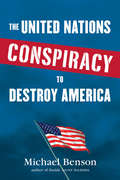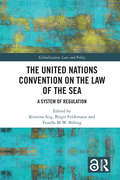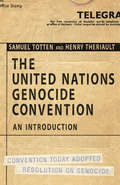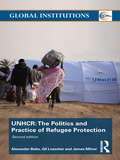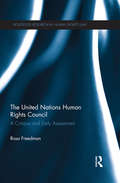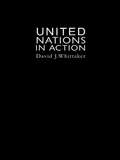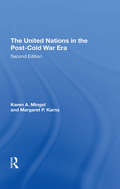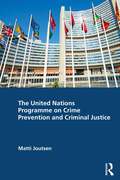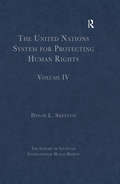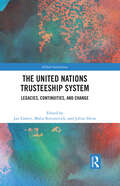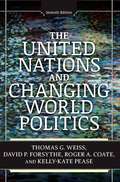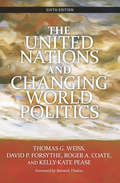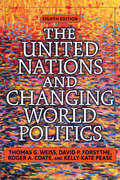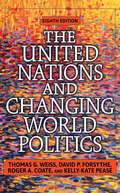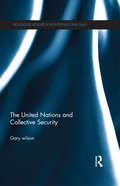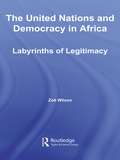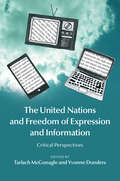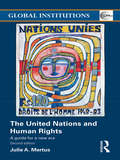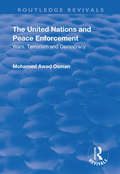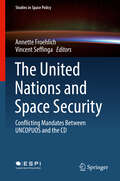- Table View
- List View
The United Nations Conspiracy to Destroy America
by Michael BensonEnemies On American Soil The shocking agenda of an organization more dangerous to America than any terrorist group. Inspired by FDR, funded by the USA, and safely sheltered on America's hallowed soil, the United Nations was conceived as a neutral, global peacekeeping body. Yet, from almost the day of its genesis, the UN betrayed the nation that empowers and protects it, allowing anti-American thieves and tyrants to corrupt its mandate and its operations. In this breathtaking exposé, Michael Benson connects far-flung facets of UN history and policy to illustrate a startling point: America is not only harboring its own worst enemy, it is also financing it with taxpayer dollars, bankrolling its own downfall. Among the revelations in this often terrifying book, Benson shows: How the United Nations is developing its own One World Army, in order to enforce their will on a global scale. How a State Department study specifically proposed giving the UN taxing power and, ultimately, control of the world. How the United Nations called for a new global reserve currency to end dollar supremacy which has allowed the United States the privilege of building a huge trade deficit. How the UN condemns Israel and empowers Hamas and other terrorist groups--the UN's gift to the free world. How the UN embraces America-hating dictators like Venezuela's Hugo Chavez, Iran's Mahmoud Ahmadinejad, and Libya's Moammar Gadhafi while condemning America's allies. Informed by the historical record and the commentary of America's best conservative thinkers, this book paints a stark portrait of this treacherous cabal that gives neutrality a bad name.
The United Nations Convention on the Law of the Sea: A System of Regulation (Globalization: Law and Policy)
by Kristina Siig Birgit Feldtmann Fenella M.W. BillingThe 1982 United Nations Convention on the Law of the Sea (UNCLOS) has for four decades been considered by many to be one of the most important legislative achievements of international law. It is revered as a "constitution of the oceans", providing the legal framework for the governance of the oceans. This volume explores how the UNCLOS is functioning in various complex settings, how it adapts to new, emerging developments, as well as how it interacts with other regulation, both within the law of the sea regime and outside. Engaging in themes such as law and order at sea, UNCLOS’ interaction with human rights and the role of private actors, the book raises complex questions in the application, understanding, and enforcement of the convention and how it can be envisaged, interpreted, and used in a dynamic world. The volume also raises methodological questions, the answers to which may enhance the predictability and coherence of the law under UNCLOS and thus secure its role as the predominant and relevant system for legal governance at sea for many decades to come. As a contribution to ensuring the future relevance of UNCLOS, the book will be a valuable resource for scholars, diplomats, judges and other practitioners who are working with and interpreting the law of the sea and related issues of maritime law, migration law, human rights law and humanitarian law.
The United Nations Convention on the Law of the Sea: A System of Regulation (Globalization: Law and Policy)
by Kristina Siig Birgit Feldtmann Fenella M.W. BillingThe 1982 United Nations Convention on the Law of the Sea (UNCLOS) has for four decades been considered by many to be one of the most important legislative achievements of international law. It is revered as a "constitution of the oceans", providing the legal framework for the governance of the oceans. This volume explores how the UNCLOS is functioning in various complex settings, how it adapts to new, emerging developments, as well as how it interacts with other regulation, both within the law of the sea regime and outside. Engaging in themes such as law and order at sea, UNCLOS’ interaction with human rights and the role of private actors, the book raises complex questions in the application, understanding, and enforcement of the convention and how it can be envisaged, interpreted, and used in a dynamic world. The volume also raises methodological questions, the answers to which may enhance the predictability and coherence of the law under UNCLOS and thus secure its role as the predominant and relevant system for legal governance at sea for many decades to come.As a contribution to ensuring the future relevance of UNCLOS, the book will be a valuable resource for scholars, diplomats, judges and other practitioners who are working with and interpreting the law of the sea and related issues of maritime law, migration law, human rights law and humanitarian law.
The United Nations Genocide Convention: An Introduction (G - Reference, Information And Interdisciplinary Subjects Ser.)
by Samuel Totten Henry C. TheriaultIt is virtually impossible to understand the phenomenon of genocide without a clear understanding of the complexities of the United Nations Convention on the Prevention and Punishment of the Crime of Genocide (UNCG). This brief but cogent book provides an introduction to the unique wording, legal terminology, and key components of the convention, which was adopted by the United Nations General Assembly in 1948. Providing clarity on the distinctions between genocide, crimes against humanity, war crimes, and ethnic cleansing, this book is designed to be an entry into further study of genocide in its legal, historical, political, and philosophical dimensions. Key terms, such as intent and motive, are explained, case studies are included, and a detailed bibliography at the conclusion of the book offers suggested avenues for more advanced study of the UNCG.
The United Nations High Commissioner for Refugees: The Politics and Practice of Refugee Protection (Global Institutions)
by Alexander Betts Gil Loescher James MilnerThis revised and expanded second edition of The United Nations High Commissioner for Refugees (UNHCR) continues to offer a concise and comprehensive introduction to both the world of refugees and the organizations that protect and assist them. This updated edition also includes: up to date coverage of the UNHCR’s most recent history and policy developments evaluation of new thinking on issues such as working in UN integrated operations and within the UN peacebuilding commission assessment of the UNHCR’s record of working for IDP’s (internally displaced persons) discussion of the politics of protection and its implications for the work of the UNHCR outline of the new challenges for the agency including environmental refugees, victims of natural disasters and survival migrants. Written by experts in the field, this is one of the very few books to trace the relationship between state interests, global politics, and the work of the UNHCR. This book will appeal to students, scholars, practitioners, and readers with an interest in international relations.
The United Nations Human Rights Council: A critique and early assessment (Routledge Research in Human Rights Law)
by Rosa FreedmanThe United Nations Human Rights Council was created in 2006 to replace the UN Commission on Human Rights. The Council’s mandate and founding principles demonstrate that one of the main aims, at its creation, was for the Council to overcome the Commission’s flaws. Despite the need to avoid repeating its predecessor's failings, the Council’s form, nature and many of its roles and functions are strikingly similar to those of the Commission. This book examines the creation and formative years of the United Nations Human Rights Council and assesses the extent to which the Council has fulfilled its mandate. International law and theories of international relations are used to examine the Council and its functions. Council sessions, procedures and mechanisms are analysed in-depth, with particular consideration given to whether the Council has become politicised to the same extent as the Commission. Whilst remaining aware of the key differences in their functions, Rosa Freedman compares the work of the Council to that of treaty-based human rights bodies. The author draws on observations from her attendance at Council proceedings in order to offer a unique account of how the body works in practice. The United Nations Human Rights Council will be of great interest to students and scholars of human rights law and international relations, as well as lawyers, NGOs and relevant government agencies.
The United Nations In Action
by David J. WhittakerThis is a clear survey of the role played by the United Nations in the major political crises of the post-war world. In covering its high-profile, peace-keeping role, its support of new nations, and its involvement in new initiatives such as famine relief and drug control, the author presents an introduction to the UN in action.
The United Nations In The Post-cold War Era, Second Edition (Dilemmas In World Politics Ser.)
by Margaret P. Karns Karen MingstThe United Nations faced unprecedented opportunities and heightened expectations when the Cold War ended in 1990. By the time of the UN's fiftieth anniversary in 1995, the mood had shifted. Peacekeepers were bogged down in Bosnia and Somalia. Iraq continued to test the UN's resolve to enforce arms control inspections. In much of the world, the gap between haves and have-nots was increasing. Everyone agreed that UN reform was needed, yet the political will to effect change was absent. With unmet challenges throughout the world, the limits to UN power and effectiveness were being realized. From regional conflicts to areas of environmental degradation and human rights abuses, the UN's success depends more than ever on the way in which three dilemmas are resolved–the tensions between sovereignty and the reality of its erosion, between demands for global governance and the weakness of UN institutions (as well as the reluctance of states to commit), and between the need for leadership and the diffusion of power. In this second edition, the authors have undertaken major revisions along with thorough updating. They explore the three dilemmas in the context of the UN's evolving role in world politics, including its experience in maintaining peace and promoting development, environmental sustainability, and human rights–the focus of an entirely new chapter. They also consider the role of various actors in the UN system, from major powers (especially the United States), small and middle powers, coalitions, and nongovernmental organizations to the secretaries-general. The need for institutional reforms and specific proposals for reform are examined. Because multilateral diplomacy is now the norm rather than the exception in world politics, the UN's effectiveness has been challenged by the new demands of the post–Cold War era. This completely revised and updated text places the UN at the center of a set of core dilemmas in world politics and provides a series of case studies that probe the politics and processes of UN action.
The United Nations Programme on Crime Prevention and Criminal Justice
by Matti JoutsenThis book documents the evolution of the United Nations (UN) Crime Programme and its changing priorities, from the early focus on juvenile delinquency and correctional treatment, to the present preoccupation with transnational organized crime. It analyses what factors have contributed to this evolution, and to the shift from the original work on “soft law” resolutions and international standards, to “hard law” conventions, and to the expansion of technical assistance. It also examines the changing structure and working methods of the Programme, such as the UN Crime Commission and the UN Secretariat unit responsible for the Programme, the UN Crime Congresses, and the Programme Network Institutes. Drawing on almost 50 years of experience on the “inside” of the UN Crime Programme and his hands-on knowledge of the working of governmental and intergovernmental processes, Matti Joutsen explores the transitions that have taken place in the UN Crime Programme over the seven decades of its existence, assesses the changing impact of the Programme, and suggests possible future directions in international cooperation in crime prevention and criminal justice.An accessible and compelling read, this book will appeal to students and scholars of criminology, sociology, politics, criminal justice, policy makers, and those interested in the evolution of the UN Crime Programme.
The United Nations Security Council in the Age of Human Rights
by Jared Genser Bruno Stagno UgarteThis is the first comprehensive look at the human rights dimensions of the work of the only body within the United Nations system capable of compelling action by its member states. Known popularly for its failure to prevent mass atrocities in Rwanda, the former Yugoslavia, and Syria, the breadth and depth of the Security Council's work on human rights in recent decades is much broader. This book examines questions including: how is the Security Council dealing with human rights concerns? What does it see as the place of human rights in conflict prevention, peacemaking and peacekeeping? And how does it address the quest for justice in the face of gross violations of human rights? Written by leading practitioners, scholars and experts, this book provides a broad perspective that describes, explains and evaluates the contribution of the Security Council to the promotion of human rights and how it might more effectively achieve its goals.
The United Nations System for Protecting Human Rights: Volume IV (The Library of Essays on International Human Rights)
by Dinah L. SheltonThe United Nations has been at the forefront of developing the international law of human rights for nearly seven decades. This volume brings together the leading research articles on the development of human rights law by the United Nations and also includes essays on issues relating to standard-setting, institutional evolution, and the creation of monitoring procedures.
The United Nations Trusteeship System: Legacies, Continuities, and Change (Global Institutions)
by Maria Ketzmerick Jan Lüdert Julius HeiseThis book considers the past and present legacies, continuities and change of the United Nations Trusteeship System by assessing consequences and legacies of decolonization in contemporary society, international organizations, and international politics. International contributors address the UN Trusteeship System as a venue for multiple state and non-state actors and its effect on the international system. Rather than viewing UN trusteeship as a bygone phenomenon the volume underscores its current relevance, particularly in view of the recent resurgence of trusteeship models such as in Kosovo and East Timor. Offering a novel and robust, yet simple and intuitive analytical framework through which to understand a broad range of cases related to the trusteeship system and its impact on the international system the book places emphasis on the agency of states in the global South and highlights the importance of multiple actors in global governance. It will be of interest to scholars of international relations theory and history in a variety of fields, ranging from African Politics, to Intergovernmental Organizations and Comparative Politics.
The United Nations and Changing World Politics
by Kelly-Kate Pease David P Forsythe Thomas G Weiss Roger A CoateThis completely revised and updated seventh edition serves as the definitive text for courses in which the United Nations is either the focus or a central component. Built around three critical themes in international relations--peace and security, human rights, and humanitarian affairs--the seventh edition of The United Nations and Changing World Politics guides students through the complexity of politics and almost seven decades of UN activities. Students of all levels will learn what the UN is, how it operates, and what its relationships are with the universe of external actors and institutions, from sovereign states to the plethora of nongovernmental and intergovernmental organizations now playing important roles in world politics. This new edition is fully revised to take into account recent events, including the UN's actions in Libya and Syria, the tenure of Ban Ki-moon, the global economic and financial meltdown, and efforts to confront nuclear proliferation and climate change.
The United Nations and Changing World Politics
by Kelly-Kate Pease David P Forsythe Thomas G Weiss Roger A CoateWith updates throughout, this newly revised sixth edition serves as the definitive text for courses on the United Nations. Built around three critical themes in international relations-international peace and security, human rights and humanitarian affairs, and building peace through sustainable development-The United Nations and Changing World Politics guides readers through the complexity of politics and history of the UN. Students of all levels will learn what the UN is, how it operates, and what its relationships are with external actors and institutions, from sovereign states to nongovernmental and intergovernmental organizations now playing important roles in world politics. Featuring a new chapter on evolving security operations and a new foreword by Ramesh Thakur, the sixth edition includes updated discussions of the UN's actions in Darfur and Chad, the tenure of Ban Ki-moon, and the global economic and financial meltdown.
The United Nations and Changing World Politics
by Kelly-Kate Pease David P Forsythe Thomas G Weiss Roger A CoateWith updates throughout, this newly revised sixth edition serves as the definitive text for courses on the United Nations. Built around three critical themes in international relations-international peace and security, human rights and humanitarian affairs, and building peace through sustainable development-The United Nations and Changing World Politics guides readers through the complexity of politics and history of the UN. Students of all levels will learn what the UN is, how it operates, and what its relationships are with external actors and institutions, from sovereign states to nongovernmental and intergovernmental organizations now playing important roles in world politics. Featuring a new chapter on evolving security operations and a new foreword by Ramesh Thakur, the sixth edition includes updated discussions of the UN's actions in Darfur and Chad, the tenure of Ban Ki-moon, and the global economic and financial meltdown.
The United Nations and Changing World Politics
by Thomas G. Weiss Roger A. Coate Kelly-Kate Pease David P ForsytheThis completely revised and updated eighth edition serves as the definitive text for courses in which the United Nations is either the focus or a central component. Built around three critical themes in international relations-peace and security, human rights and humanitarian affairs, and sustainable human development-the eighth edition of The United Nations and Changing World Politics guides students through the seven turbulent decades of UN politics.This new edition is fully revised to incorporate recent developments on the international stage, including new peace operations in Mali and the Central African Republic; ongoing UN efforts to manage the crises in Libya, Syria, and Iraq; the Iran Nuclear Deal; and the new Sustainable Development Goals. The authors discuss how international law frames the controversies at the UN and guides how the UN responds to violence and insecurity, gross violations of human rights, poverty, underdevelopment, and environmental degradation. Students of all levels will learn that the UN is a complex organization, comprised of three interactive entities that cooperate and also compete with each other to define and advance the UN's principles and purposes.
The United Nations and Changing World Politics
by David P. Forsythe Thomas G. Weiss Roger A. Coate Kelly-Kate PeaseThis completely revised and updated seventh edition serves as the definitive text for courses in which the United Nations is either the focus or a central component. Built around three critical themes in international relations--peace and security, human rights, and humanitarian affairs--the seventh edition of The United Nations and Changing World Politics guides students through the complexity of politics and almost seven decades of UN activities. Students of all levels will learn what the UN is, how it operates, and what its relationships are with the universe of external actors and institutions, from sovereign states to the plethora of nongovernmental and intergovernmental organizations now playing important roles in world politics. This new edition is fully revised to take into account recent events, including the impact of the global financial crisis and recession on international politics, UN actibvities related to peacekeeping and natural disasters, the UN’s actions in Libya and Syria and the Arab Spring, the tenure of Ban Ki-moon, Rio+20, and the Iranian nuclear issue.
The United Nations and Changing World Politics
by Thomas G. WeissThis completely revised and updated eighth edition serves as the definitive text for courses in which the United Nations is either the focus or a central component. Built around three critical themes in international relations?peace and security, human rights and humanitarian affairs, and sustainable human development?the eighth edition of The United Nations and Changing World Politics guides students through the seven turbulent decades of UN politics.This new edition is fully revised to incorporate recent developments on the international stage, including new peace operations in Mali and the Central African Republic; ongoing UN efforts to manage the crises in Libya, Syria, and Iraq; the Iran Nuclear Deal; and the new Sustainable Development Goals. The authors discuss how international law frames the controversies at the UN and guides how the UN responds to violence and insecurity, gross violations of human rights, poverty, underdevelopment, and environmental degradation. Students of all levels will learn that the UN is a complex organization, comprised of three interactive entities that cooperate and also compete with each other to define and advance the UN's principles and purposes.
The United Nations and Changing World Politics: Revised And Updated With A New Introduction
by Thomas G. WeissThis completely revised and updated eighth edition serves as the definitive text for courses in which the United Nations is either the focus or a central component. Built around three critical themes in international relations (peace and security, human rights and humanitarian affairs, and sustainable human development) the eighth edition of The United Nations and Changing World Politics guides students through the seven turbulent decades of UN politics. This new edition is fully revised to incorporate recent developments on the international stage, including new peace operations in Mali and the Central African Republic; ongoing UN efforts to manage the crises in Libya, Syria, and Iraq; the Iran Nuclear Deal; and the new Sustainable Development Goals. The authors discuss how international law frames the controversies at the UN and guides how the UN responds to violence and insecurity, gross violations of human rights, poverty, underdevelopment, and environmental degradation. Students of all levels will learn that the UN is a complex organization, comprised of three interactive entities that cooperate and also compete with each other to define and advance the UN's principles and purposes.
The United Nations and Collective Security (Routledge Research in International Law)
by Gary WilsonThe role of the United Nations in collective security has been evolving since its inception in 1945. This book explores collective security as practiced within the legal framework provided by the United Nations Charter, with a particular focus upon activity undertaken under the auspices of the UN Security Council, the body conferred by the Charter with the primary responsibility for the maintenance of international peace and security. Although the book is primarily grounded in international law, where appropriate it also draws upon relevant political insights in order to present a clear picture of the UN collective security system in operation and the factors which impact upon the way in which it functions. Offering a comprehensive analysis it considers the full range of measures which can be utilised by the UN in the performance of its collective security remit including military enforcement action, peacekeeping, non-military sanctions and diplomacy. The book considers each of these measures in detail, assessing the legal framework applicable to the form of action, the main legal controversies which arise in respect of their appropriate utilisation, and the UN’s use of this collective security ‘tool’ in practice. The book draws conclusions about the main strengths and shortcomings of the various means through which the UN can attempt to prevent, minimise or end conflict.
The United Nations and Democracy in Africa: Labyrinths of Legitimacy (Studies in International Relations)
by Zoë WilsonThis book explores UN bureaucracy and the development dysfunction it sows in four 'most different' African countries: Angola, Botswana, Namibia, and Tanzania. Wilson's original purpose for researching this book was to uncover new solutions to some of the United Nations' most vexing implementation problems. Yet, as research unfolded, it became clear that the reasons for those problems lay tangled up in bureaucratic and philosophical quagmires of a much more fundamental nature. The United Nations and Democracy in Africa is the documentation not only of these bureaucratic and philosophical absurdities that find expression through development practice, but also the journey of the author from ardent defender of the UN to profound sceptic.
The United Nations and Freedom of Expression and Information
by Mcgonagle, Tarlach and Donders, Yvonne Tarlach Mcgonagle Yvonne DondersThere are a multitude of UN legal instruments which pertain to the rights of freedom of expression and information, and this book is the first to comprehensively map them and their function. It details the chequered history of both rights within the UN system and evaluates the suitability of the system for overcoming contemporary challenges and threats to the rights. Leading scholars address key issues, such as how the rights to freedom of expression and information can come into conflict with other human rights and with public policy goals, such as counter-terrorism. The book's institutional focus comprises five international treaties, UNESCO and the UN Special Rapporteur on freedom of expression. Relevant for academics, lawyers, policy-makers and civil society actors, it also examines how new communication technologies have prompted fresh thinking about the substance and scope of the rights to freedom of expression and information.
The United Nations and Human Rights: A Guide for a New Era
by Julie A MertusJulie Mertus’ highly acclaimed text continues to be the only completely up-to-date comprehensive yet succinct guide to the United Nations human rights system. Today, virtually all UN bodies and specialized agencies are undertaking efforts to incorporate the promotion or protection of human rights into their programs and activities. The United Nations and Human Rights examines these recent initiatives within the broader context of human rights practice, including the promotion of individual rights, management of international conflict and the advancement of agendas of social movements. The fully revised and updated second edition not only provides a complete guide to the development, structure and procedures within the UN human rights system, but also reflects the vital changes that have occurred within the UN system, devoting considerable attention to expanding the range of issues discussed, including: new developments in the Office of the High Commissioner for Human Rights the current controversy surrounding the new Human Rights Council expanded treatment of economic and social rights. A superb addition to any human rights syllabus, this book maintains its position as essential reading for students and practitioners of human rights, international relations and international law.
The United Nations and Peace Enforcement: Wars, Terrorism and Democracy (Routledge Revivals)
by Mohamed Awad OsmanThis title was first published in 2002.This original text studies the UN system for the maintenance of international peace and security in the face of threats to the peace, breaches of the peace and acts of aggression. It assesses the Security Council attempts to employ enforcement measures under Chapter VII of the UN Charter in response to inter-state and intra-state conflicts, paying attention to the effect of the Council's increasing involvement in internal situations, both on the development of the system and on the outcome of conflicts. Filling a notable lacuna in contemporary literature, Mohamed Osman studies peace enforcement on its own and within an independent theoretical and empirical framework. The book will appeal both to students of the UN and humanitarian intervention, but also to international lawyers and political philosophers concerned with questions of intervention and sovereignty. In addition, its detailed case studies make the volume an excellent reference tool.
The United Nations and Space Security: Conflicting Mandates between UNCOPUOS and the CD (Studies in Space Policy #21)
by Annette Froehlich Vincent SeffingaThis book provides a detailed analysis on the history and development of the Committee on the Peaceful Uses of Outer Space (UNCOPUOS) and the Conference on Disarmament (CD) and the coordination and cooperation between these two fora. Furthermore, it discusses the future challenges that these fora will have to deal with and conclude in which way the current system can change to cope with the evolution of space matters. This is necessary for the proper discussion of space matters because these matters cannot simply be divided between military and non-military, but are interrelated.
